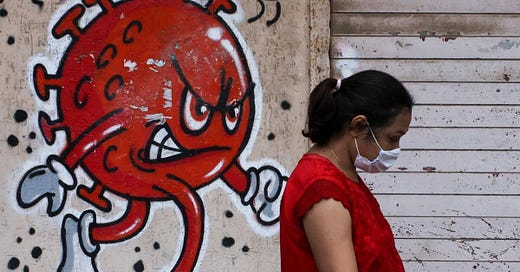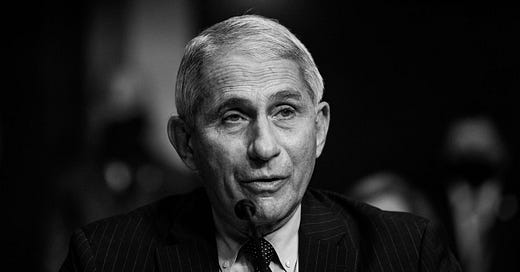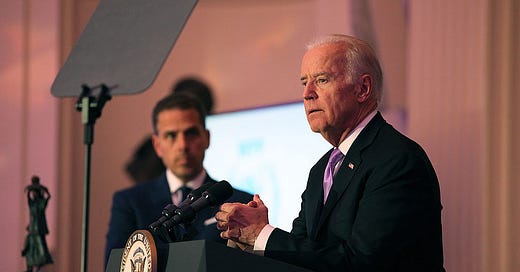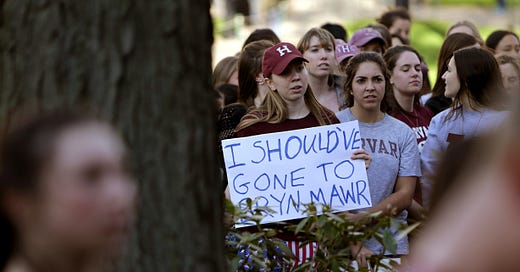

Discover more from Social Studies
Thread: What's up with the Covid Dead Enders?
Does it seem like some people really don't want the pandemic to end?
Omicron’s hospitalization rate is a third to a half that of Delta. Of those who are hospitalized, the new strain sends patients to the ICU at half the rate and keeps them in hospital for half the duration of Delta. Because it’s so much more transmissible, in absolute numbers, it’s true that more people are being admitted to the hospital in this Omicron wave than ever before. But their cases are nowhere near as serious.
By all indications, we’re on our way toward the endemic phase of Covid-19. It’s long been clear that this is how it would likely end. The vaccines have saved countless lives, to be sure. But between tens of millions of people choosing not to get inoculated and the vaccines being far less effective than initially believed — particularly with regard to transmissibility and particularly with the emergence of Omicron — it’s been obvious to anyone paying close attention that the shots alone would not be our off-ramp from the pandemic.
What that off-ramp will more likely look like is the virus just becoming less and less central of a concern in our daily lives. It will remain a fact of life indefinitely, maybe even permanently, and will become, if anything, even more ubiquitous. But between the introduction of effective new treatments and the spread of a less deadly dominant strain, it will become less of a menace and more of a lingering nuisance to most people, even while remaining a serious concern for the elderly and immunocompromised.
From my vantage point, that seems to be what’s happening now. Every day I hear of someone else I know who has Covid, and yet I’m hearing this news from those who have caught it with a shrug rather than with grave consternation.
This is all good news, even if perhaps a bit anticlimactic to those who were hoping for an end that involved V Day parades in the streets. But that’s not how it’s being received, or at least not in my social media feeds (which, especially since the onset of the pandemic, have become not just proxies for but the damn near totality of many of our social existences).
Instead, I’ve seen something more inexplicable: anger. Among the left-of-center PMC class, there is annoyance to outright fury at any suggestion that the most disastrous part of the pandemic might be over. It’s like the inverse of the “This is fine” meme.
Some of it might just be that people are interpreting the facts differently than I am. I try not to chalk up to ignorance or malice what could be explained by good faith disagreement. One might look at the current Omicron numbers and see no way for hospitals to avoid being utterly overwhelmed this winter, forcing people to cancel life-saving procedures to make way for Covid patients. Or they might anticipate that the sheer level of circulation guarantees that new strains will emerge that will be as contagious as Omicron and even more deadly than Delta. These, in my opinion, are not very good arguments, but they’re not made in bad faith.
But I can’t help but feel like the volcanic reaction from some quarters to any opinion that falls short of proclaiming the sky’s inevitable fall is fueled by something more visceral than mere disagreement on the merits. I have no proof of this and I could be wrong, but it seems like some people have a pathological need for the pandemic to continue. I’ve thought a lot about what could explain it, and I’m at a loss. I don’t even have a hypothesis. So I thought I’d smell test it here.
Two questions:
Do you perceive from some people this weird, deep-seated desire for the pandemic to continue, as I do? As in, do you even know what I’m talking about?
Do you have a theory as to what could account for it?
By the way, you obviously don’t have to agree with my priors. If my presumption that the pandemic is slowly winding down (I’m speaking strictly in epidemiological terms here — the politics is a whole different story) is way off, say so (preferably with some evidence to show it).
Open thread.
Subscribe to Social Studies
Politics, media and social theory












I saw this last night and I had to think about it before I commented.
(1) Yes, there are people who can't stand to see the pandemic end, though how many there are and how many others are just enabling them because they don't want to be accused of being insensitive or not appropriately cautious or wanting Granny to die, I don't know. But between those two groups, it's a large enough share of the population to make all our lives miserable.
As for the second, I think the "theory" is multifaceted and has to do with a few things, outside of the obvious, which is certain people have gained immense amounts of power through this and it's an easy "if it bleeds--or gasps--it leads" for the media:
(A) We cannot deal with aging, illness, and death. It's not that we necessarily look down on people who are experiencing those, but we do try to hide them away. As a personal matter, the idea that we are going to age, we are going to be ill, and, yes, we are going to die is something people can't wrap their heads around. They will do anything to avoid it, including giving up their lives and hiding, so basically exchanging living for surviving. I chalk a lot of this up to our culture's emphasis on youth and the fact that we no longer are intimately involved with extended family. We prefer to put our elderly in assisted care or nursing homes than to bring them into ours and watch their lives end and realize that's where we all end up, and it's just nature, but even age, illness, and death can be important stages.
(B) People *need* purpose. If they can't find purpose, they will make purpose, in healthy ways and unhealthy ways. We used to find purpose through the simple act of surviving from day to day (scratching a living from the dirt) or religion. But religion is losing its value, and most people no longer have to struggle to survive (think Maslow's Hierarchy of Needs). In an effort to find purpose and make life meaningful, people give outside meaning to otherwise meaningless things, like COVID, and lose the ability to do a rational cost-benefit analysis. Many of us work meaningless jobs, just a warm body, we're not close to our families, we don't build up large groups of friends like we used to, and most of us don't even have large extended families. We just have our jobs, our TV, and our social media. Enter COVID to bring our purpose back--an illusion of "just surviving" that takes us back to our digging in the dirt and avoiding the predators days.
(C) It's become a religion for some people. I don't know how to say it any better than that. The "saved" are the ones who follow the rules, worship the CDC and Fauci, and are willing to sacrifice anything to save even one elderly person who is already dying of ten other things and the "damned" who aren't willing to sacrifice the education of the local children to save themselves, even though they themselves are elderly. This goes back to B but it also ties into D.
(D) We live in a strange culture that values fear and victimhood. We could talk about this for hours, but look around you. Just one example, we made elderly people die alone without the company of young people who had less of a chance of succumbing to COVID than being blinded by their own tears and walking out in front of a bus. And we *valued* that. We saw that as making a valiant sacrifice. It wasn't. It was cruelty of a repulsive nature, but very few pointed it out. But you can also see this in the reaction to "good news." I mean, you have to go to "crazy right wing" sites to actually see that Omicron isn't that deadly or that natural immunity works or that *gasp* even in the early days not everyone who was exposed to COVID got it. These were all good news, but you were evil if you pointed it out because we value fear.
(E) This has less to do with people and more to do with our medical system. Our medical system, bar none, is the most expensive in the world, and even before COVID it was inept. Everyone has at least one "war" story of dealing with it. Hospitals are chronically short staffed, doctors are chronically over worked, and patients are chronically ill-served, and underneath it all is greed and corruption that goes unchecked because, well, everyone wants to live and feel good (even if not be healthy, which are two different things) and you can kill as many customers as you like because there will always be more. In 2017, Johns Hopkins did a study and they decided that in any given year between 250K and 500K people die as a result of medical malpractice, most of it misdiagnosis. I remember New York hospitals being strained during the flu season. One of our own local hospitals routinely runs out of beds in the same season, and we're a hub of two large systems. The medical industry (Big Pharma, Big Med, etc.) sucks money like a vacuum and offers not even consistent competency in return, and no one--and I mean *no one*--tries to make it accountable. Look at ObamaCare. What did it do? Go through and eliminate the waste in the medical system, focus on preventative care and diet, set up programs to train more doctors and nurses and break the strangle hold higher ed has on entry into that class? Did it look at tort reform or patent laws to alleviate the costs of medicine and procedures? Nope, none of that. What did it do? Make everyone buy insurance and the taxpayers foot the bill for those who couldn't afford to pay into this giant abyss of fiscal waste and greed. COVID would not have been a problem had our medical system been worth what we pay for it, but it's not, and the last thing they want you to do is notice that, so they have a vested interest in keeping the "pandemic" going and they have an outsized influence in the media and politics.
Those are the five reasons I have. I'm sure others can pinpoint more.
I'd also encourage you to look of a Dr. Robert Malone and his talks on "mass formation psychosis." You may have already heard of him, but it's worth a listen.
I may have a helpful perspective on this, as my wife is a writer and is on one of those women writers group lists/chats (mostly journalists and novelists and screenwriters, many of whom are well known, all of them living in NYC/LA/SF).
The first thing to note is that the Covid freakout follows on the Trump freakout (both of which were intensified by the Floyd freakout).
Something possibly historically unprecedented (if that is poss) happened to the upscale-urban-liberal thinking class when Trump beat Hillary: it seemed like literally overnight every person we knew who used to be a cynical Big City libertine was transformed into a neurotic scolding dogmatic raging Puritan whose entire purpose in life was now the complete destruction of Trump, the Republicans, and all their voters (well, that and policing thought and demonizing heretics). Team Blue (esp its most fervent believers) has basically been undergoing a single nonstop monumental nervous breakdown since Nov 2016.
So to get to your questions:
When I listen in on these writers' chats, the level of COVID terror is both bizarre and hilarious/disturbing. If you just woke up from a 2-yr coma you would think they were describing the Black Plague. And listening to them discuss Omicron, you would think that Richard Ramirez the Night Stalker was just spotted on the block.
So my answer to question 1 is YES, not only do I perceive it, but from my perspective, I just don't see this ending anytime soon and I'm not quite sure what can break this fever, maybe either Trump dying or a massive Republican landslide. COVID now is another battle in the Culture War, so if they can't destroy their opponents and have them banished from society, there will have to be some way for them to back down and save face.
As for question 2, some more guesses at the causes:
It seems that Team Blue is addicted to fear, enjoys being addicted to fear, their fear makes them feel righteous and a much better person than the non-fearful, and their entire lives are about neurotically signalling all the proper beliefs.
Also, Twitter has turned the blue-check caste into perpetual raging toddlers who throw a tantrum whenever they don't get their way, and (this might be the root) they really deeply believe that their degrees, hipness, literary and culinary tastes, fancy jobs, and most of all their obviously bulletproof and superior morality gives them the divine right to tell the rest of us what to do, how to live, think, etc etc.
So I wouldn't get my hopes up about this hysteria fading anytime soon--but hopefully I'm wrong!